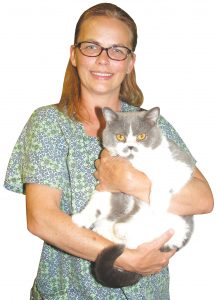WINNSBORO (July 21, 2016) – Athletes train for the better part of their lives to make it to the Olympics. And while Susan Knight has plenty of training, most of it wasn’t in a gym, on a track or in a pool. But she is going to Rio this summer, nonetheless.
She just had to fill out the right form.
Knight, a vet tech at Fairfield Animal Hospital, is headed south of the equator next month for the XXXI Olympic Games in Rio de Janeiro, Brazil as a volunteer. After a two-week stay, she’ll be back in Rio in September for the 2016 Paralympics.
Knight, who trained as a phlebotomist and worked in the plasma industry in Florida, will use her skills to help monitor athletes for the use of performance-enhancing drugs – also known as “doping.” Knight said she would be involved in either drawing blood from athletes or in chaperoning urine samples to laboratories for testing. And her duties will not be limited to the human athletes competing in Rio, she said, but will also include horses competing in the equestrian events.
“I don’t expect to see a lot of it (doping),” Knight said.
But doping has made a lot of Olympic headlines recently. The Russian track and field team has been barred from the 2016 summer games, while the BBC reported this week that the International Olympic Committee (IOC) is considering a blanket ban on all Russian teams in the wake of a doping scandal that emerged from the 2014 Winter Olympics and appears to stretch as far back as 2011.
Detecting performance-enhancing drugs can be tricky, Knight said.
“There are things in your diet that can cause false positives,” she said.
Poppy seeds – even on bagels or muffins – can trigger a false positive for illegal drugs like heroin, Knight said, while normal everyday foods like chicken, beef or even milk can contain human growth hormones (HGH), a common performance-enhancing supplement.
“Athletes are pretty much aware of most foods that can trigger a false positive,” Knight said, “and they know what not to eat 30 days before competition.”
A detailed questionnaire accompanies the testing, Knight said, to help testers determine if a false positive is possible. Horses, however, can’t answer a whole lot of questions about what they’ve eaten.
“If you get a false positive on a horse, chances are it has been given a steroid or antibiotic that could trigger that false positive,” Knight said. “Things like that don’t normally show up in horse feed.”
For the Paralympic Games, Knight will get out of the labs and onto the fields where she will be involved with timing and scoring of events.
The Zika Virus has probably made more headlines leading up to the games as doping, as South America has been hardest hit by the mosquito-borne illness. But Knight said she wasn’t particularly concerned with bringing a dose home.
“I’m not worried,” she said. “It’s actually winter down there. The temperatures are in the mid-70s, so it’s not warm enough to be wearing shorts and short sleeves.”
The trip involves a real personal commitment from Knight, as she is paying for nearly the entire affair out of her own pocket.
“The only thing they provide is your uniform, lunch on work days and transportation to and from the events,” Knight said.
But it won’t be all work and no play for Knight. Every two or three days, she said, she will have a day off in between. She said she looks forward to taking in some of the competition.
“Especially the gymnastics,” she said.















